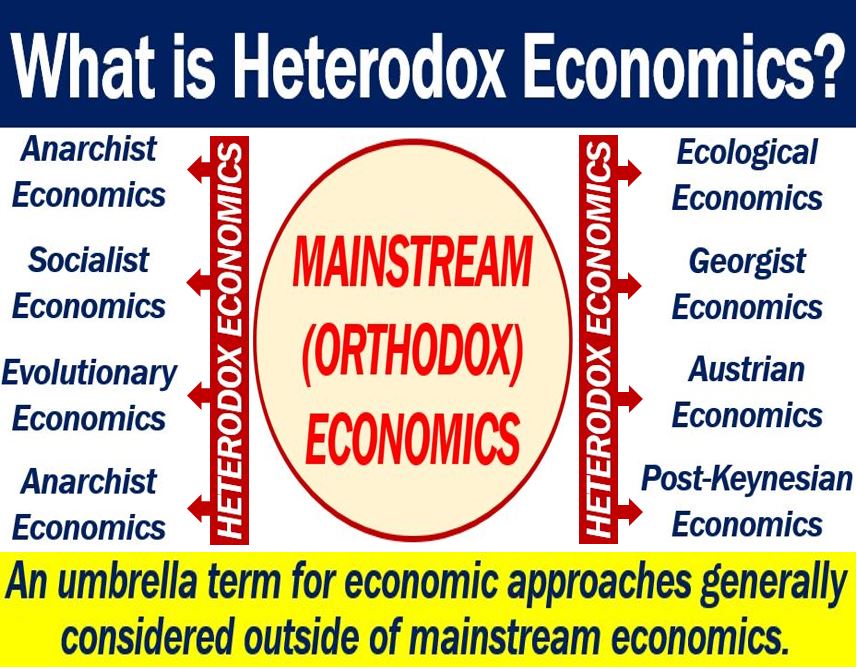Heterodox economics – definition and meaning
Heterodox economics refers to economic theories which are outside of mainstream economics. That is, mainstream economists say they are outside. For example, Austrian and Marxian economics, in the opinion of mainstream economists, are examples of heterodox economics. Anarchist, socialist, and evolutionary economics are also in this category.
However, heterodox and mainstream economists refer to each other differently. Heterodox economists, for example, refer to mainstream economists as ‘conventional‘ or ‘orthodox.’
Mainstream economists, on the other hand, refer to heterodox economists as ‘fringe‘ or ‘non-orthodox‘ economists.
Wikipedia has the following definition of the term:
“Heterodox economics refers to schools of economic thought or methodologies that are outside ‘mainstream economics,’ often represented by expositors as contrasting with or going beyond neoclassical economics.”
Is heterodox economics an alternative?
Most mainstream subjects have ‘fringe’ or ‘alternative’ supporters. For example, alternative medicine covers many health conditions and therapies.
Most people who studied medicine at university and became doctors see, for example, homeopathy as a ‘fringe’ subject. Some of them describe homeopathy as alternative medicine.
Homeopaths, on the other hand, refer to modern doctors as proponents of ‘conventional’ or ‘orthodox’ medicine.

Heterodox economics also offers an ‘alternative’ approach. However, in this case, it is an alternative to mainstream economics.
Heterodox economists tend to weave historical and social factors into their analyses. Rather than trying to approach economics scientifically, they use other methods, mainstream economists say.
Heterodox and neo-classical economics
Strict followers of neo-classical economics believe that all other approaches are in the heterodox economics category.
Neo-classical economics is a theory that believes that the consumer is ultimately the driver of market forces. The consumer’s aim is customer satisfaction while the supplier’s goal is profit maximization.
The University of Bristol’s Handbook for Economic Lecturers says that there is something wrong with the term ‘non-orthodox.’ Therefore, describing heterodox economics as non-orthodox is problematic.
If you say non-orthodox, that begs the further question of whether an identifiable orthodoxy exists.
The Handbook adds:
“For some economists, the term orthodoxy has been misused or become redundant. It remains associated with the neo-classical economics of Marshall, Hicks and Samuelson.”
“In that way, it ought to be distinguished from ‘mainstream’ economics, which is not neo-classical or is splitting up.”
In fact, mainstream includes many different strands, one of which is neo-classical economics. Many of the other strands, however, are inconsistent with both each other and neo-classical economics.
Video – What is Heterodox Economics?
This Modern Classical Econ video has an interesting discussion on the meaning of heterodox economics.
Anwar Shaikh begins by explaining that it is broadly conceived as an approach that departs from some aspects of orthodox economics.

